10 Proven Ginseng Tea Benefits
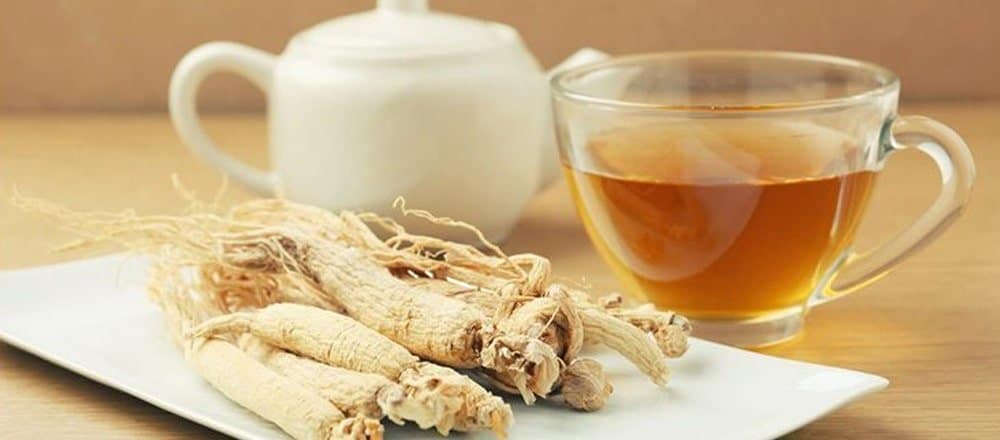
Were you aware that drinking ginseng tea has many benefits? Ginseng tea is a beverage that has been consumed for centuries in Asia for its medicinal properties. Recently, it has become popular in the United States and Europe as well.
The health benefits of ginseng tea include reducing inflammation, aiding weight loss, boosting energy levels, and improving cognitive function. In this blog post, we will explore the scientific evidence behind these claims and discuss how you can enjoy the health benefits of ginseng tea.
Table of contents
- Properties of Ginseng Tea
- Ginseng Tea Benefits
- 1. Benefits of Ginseng Tea for Skin Health
- 2. Ginseng Tea for Libido
- 3. Ginseng Tea Antidepressant
- 4. Ginseng Tea for Hair Growth
- 5. Ginseng Tea for Weight Loss
- 6. Does Ginseng Tea Help with Inflammation?
- 7. Ginseng Tea for Diabetes
- 8. Ginseng Tea and Cognitive Function
- 9. Ginseng Tea Benefits Fibromyalgia
- 10. Ginseng Tea Cancer Studies
- Side Effects of Ginseng Tea
- Ginseng Tea and Pregnancy
- Conclusion
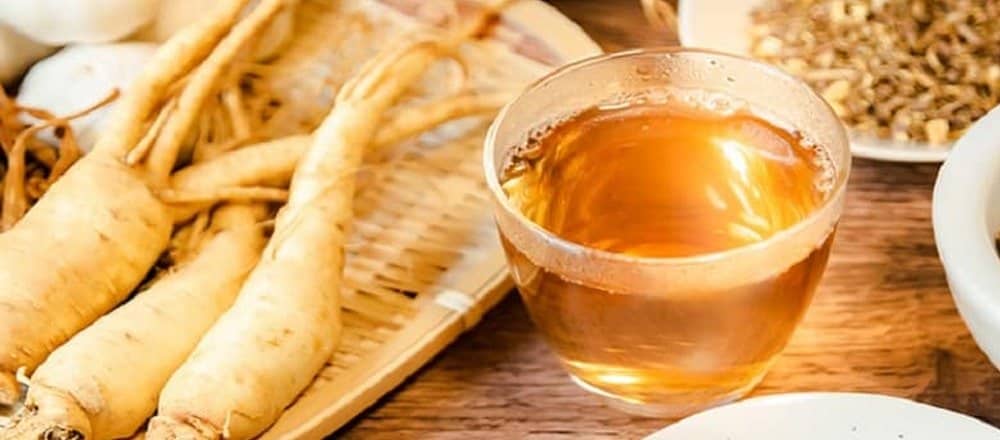
Properties of Ginseng Tea
There is much to say about this slow-growing perennial plant belonging to the Araliaceae (ivy) family. More specifically, we’d like to discuss what’s nestled underground.
Measuring 5-7cm long (1-2 inches), the root is the component that offers the most in terms of Ginseng Tea’s properties. Whether it’s Korean Ginseng (Panax ginseng) or American Ginseng (Panax quinquefolius), you’ll receive ginsenosides.
Ginsenosides are chemical compounds that, when consumed on a frequent basis, serve as potent antioxidants. Ginseng tea is rich in antioxidants, which can help protect your cells from damage. It also contains substances that may boost your immune system, increase your energy level, and improve your mental function. Ginseng tea is also a good source of vitamins and minerals, including vitamin C, manganese, and potassium.
Ginseng Tea Benefits
The health benefits of Ginseng Tea date back millennia. In Traditional Chinese Medicine (TCM), a holistic approach to healing, the Herbal Tea is said to strengthen “Qi”, the vital energy of the body.
Everything about your existence consists of Qi, according to TCM. It is the force that balances life and treats a vast multitude of mental and physical ailments. And Ginseng Tea plays a role.
But what can it achieve according to modern science? Is there more to it than its sweet and earthy flavour with herbaceous and almost citrusy undertones? You’ll be pleased to know that there is indeed. We now have proof, for instance, that it maintains the skin’s vitality, helps with erectile dysfunction, alleviates anxiety and even promotes weight loss. Allow us to examine its abilities in depth.
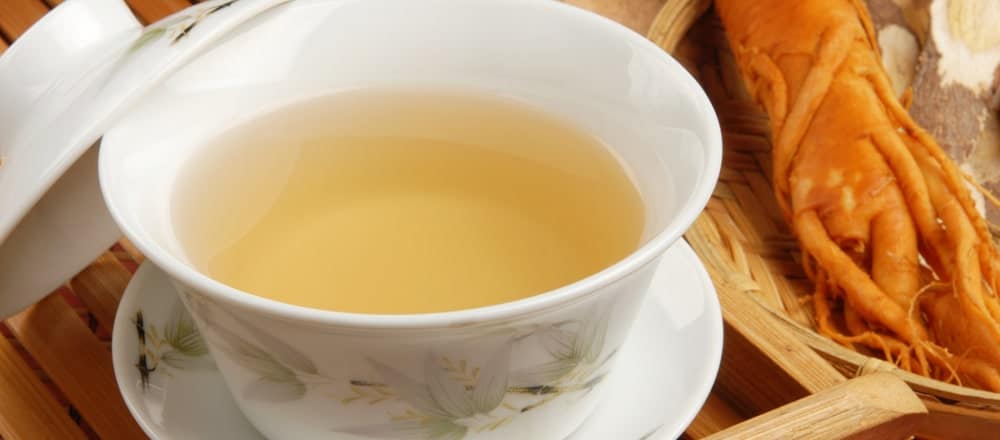
1. Benefits of Ginseng Tea for Skin Health
People have long considered the topical application of Ginseng Tea for eczema, acne and other skin blemishes an excellent choice. Another remarkable quality is that it seems to have anti-ageing properties.
A 2017 study published in the Journal of Ginseng Research has the evidence. It demonstrated that 21 Korean women who had the Tea alongside a Chinese fruit experienced inhibited wrinkle formation.
Additionally, the abundance of Vitamin D and B-12 can slow the degeneration of collagen, a structural protein needed to maintain the skin’s elasticity. Though collagen loss is normal in someone’s 20s and 30s, it would appear that Ginseng Tea benefits can offset it somewhat. A 2020 study published in the same Journal of Ginseng Research went further still to show that it could restore elasticity already lost.
2. Ginseng Tea for Libido
Erectile dysfunction (ED) affects around 4.3 million people – the equivalent of one in five men – in the UK alone. It is a condition characterised as an inability to get or maintain an erection. The good news is that Ginseng Tea for erectile dysfunction could treat impotence.
The answers come from a 2002 study published in the Journal of Urology, where 45 men volunteers with ED were split into two groups.
The first group consumed a 900-mg dose of Ginseng Tea three times daily, while the second group received a placebo. Following several weeks, scientists concluded that the Herbal Tea group had significantly improved ED symptoms compared to the placebo group.
Nevertheless, despite these promising results, it remains paramount that you seek medical consultation if you have ED.
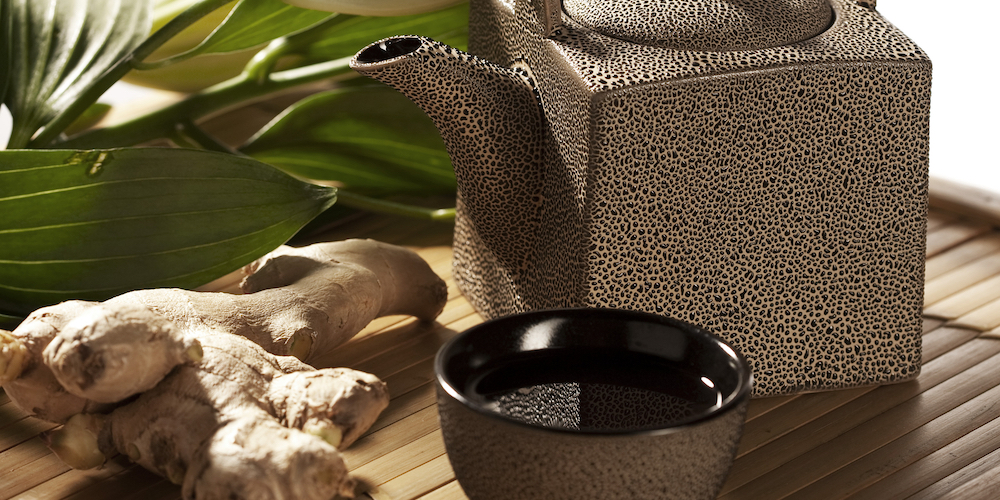
3. Ginseng Tea Antidepressant
It is essential to recognise the differences between depression and anxiety. The former refers to a single condition that might produce varying symptoms.
The latter is a term with many meanings, including “feeling anxious” and a medical group of conditions. This leads to the question: Is drinking Ginseng Tea for anxiety a worthwhile endeavour, or is it better with depression? It could be both.
According to a 2013 study, the Tea might assist in protecting the body against the effects of stress and anxiety, as well as reducing anxiety-related fatigue. The primary reason, the researchers proposed, was its antioxidant properties working on a molecular level.
Then there was a 2017 study published once again in the Journal of Ginseng Research establishing that it suppresses stress-induced depression.
4. Ginseng Tea for Hair Growth
Alopecia areata is an autoimmune disorder that is easily recognisable by patchy hair loss. It can sometimes start with small patches that are almost unnoticeable.
However, when these patches connect, they may become difficult to ignore. Alopecia isn’t a condition to worry about in the conventional sense. Still, it can take a toll on a person’s mental health. What are the benefits of Ginseng Tea for hair growth?
A 2018 study published in the International Journal of Molecular Sciences suggested that having it in hair growth products could boost their efficiency. A 2015 study published in the Journal of Medicinal Food drew similar conclusions, noting that the presence of ginsenosides contributed to hair growth.
Just don’t expect it to be a fix-all solution until more human-based studies are conducted.

5. Ginseng Tea for Weight Loss
Does Ginseng Tea help you lose weight? It would seem likely. For starters, Ginseng Tea’s calories are minimal at about ten calories per 8-oz serving.
There is also yet more scientific evidence from the Journal of Ginseng Research, published in 2014, that consuming it twice daily for eight weeks leads to considerable reductions in body weight. A 2010 animal-based study supports the claim.
But why and how, exactly, does it happen? The theory is that it boosts the metabolism of fat cells. Doing so enables the body to burn fat quicker and more efficiently, leading to periods of exercise producing more noticeable changes.
The issue is that it isn’t going to do all of the heavy lifting for you – literally and figuratively. In other words, you’ll still need to exercise and eat well to drop those extra pounds.
6. Does Ginseng Tea Help with Inflammation?
This infusion’s usefulness for weight loss might well depend on exercise. But drinking Ginseng Tea for inflammation caused by such activity could help you on your way towards your goals.
In one 2011 study on 18 young male athletes, participants took the herb three times daily over a week. The results showed lower inflammatory markers in those who had the Tea compared to the placebo group that didn’t.
Its potent anti-inflammatory properties are the product of its extraordinarily high ginsenoside content. As mentioned previously, ginsenosides are likewise powerful antioxidants that combat oxidative stress.
Further evidence exists in another 2011 study, published in the Journal of Immune Network, that demonstrated the anti-inflammatory and antioxidant activity of Ginseng Tea.
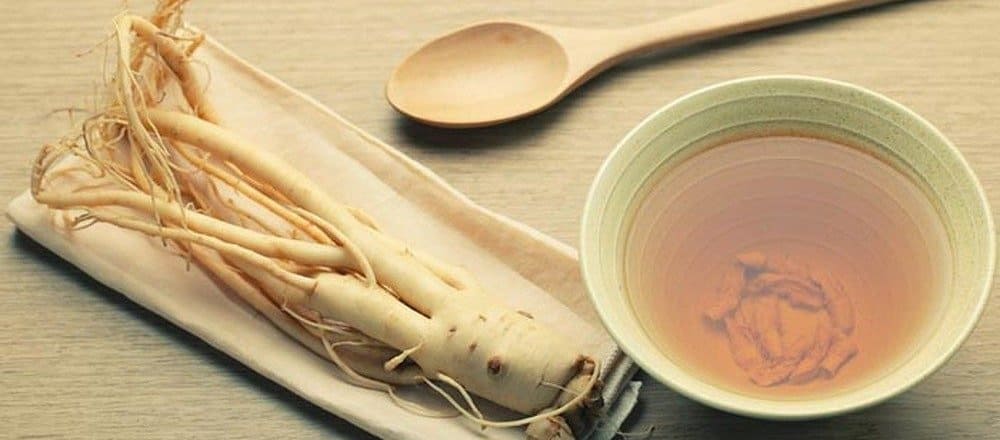
7. Ginseng Tea for Diabetes
Correlations have been uncovered between balanced blood sugar levels in people with diabetes and Ginseng Tea consumption. One study published in the Journal of Evidence-Based Complementary and Alternative Medicine investigated the Tea’s effects on 19 volunteers who had diabetes. It turned out that six grams daily over 12 weeks helped participants maintain good blood sugar control.
But there’s more. These same participants also had a 38% decrease in fasting insulin and a 33% increase in insulin sensitivity, two qualities that support those with type-2 diabetes. Another study published in the Journal of the American College of Nutrition had similar findings, albeit with American Ginseng rather than Korean Ginseng. Neither Tea should be taken instead of medically-proven treatments.
8. Ginseng Tea and Cognitive Function
An estimated 750,000 Britons have dementia or Alzheimer’s Disease, a number that could double over the next 40 years as the country’s population ages.
Interestingly, a British Study conducted at the Brain Performance and Nutrition Research Centre discovered that Ginseng Tea benefits enhanced cognitive function. It noted an improvement in mental arithmetic capabilities in volunteers after eight days.
Furthermore, multiple studies have demonstrated the Tea’s positive influence on memory, behaviour and mood in those experiencing cognitive decline. One such study from 2006 recognised it as a valuable option to slow neurodegenerative diseases.
Another clinical trial from 2008 stated that it could be a treatment for Alzheimer’s Disease – at the same time as emphasising the need for more research.
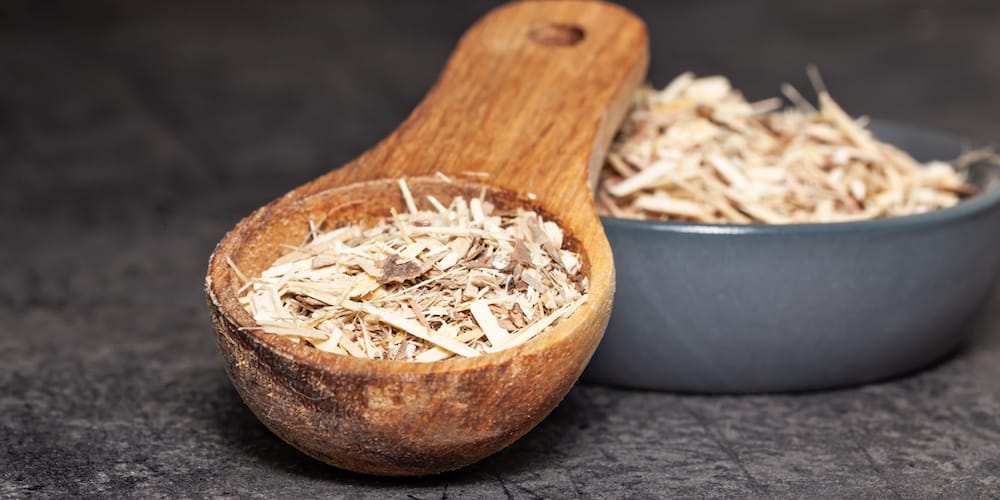
9. Ginseng Tea Benefits Fibromyalgia
Fibromyalgia is a condition known for causing widespread pain and extreme tiredness. Although its symptoms can vary from person to person, most experience it as pain all over the body.
What causes fibromyalgia is uncertain – and, sadly, there is no cure. However, painkillers, talking therapies and exercise programmes may help, alongside the health benefits of Ginseng Tea.
In one clinical trial, 39 female participants aged between 27 and 58 were split into three groups. The first group had Loose Ginseng Tea, the second had a drug for fibromyalgia, and the third received a placebo.
By the third week, the herb group noticed an improvement in fatigue. By the twelfth week, their fatigue had been reduced even more compared to both the drug and placebo groups.
10. Ginseng Tea Cancer Studies
It is vital to acknowledge that consuming Ginseng Tea for its reported anti-cancer properties should not under any circumstances be treated as an alternative to chemotherapy or medication.
The Kent and Sussex Tea and Coffee Company do not endorse it for preventing cancer, nor do we recommend having it before seeking medical consultation. With that out of the way, we can move on to its possible role.
According to a 2016 meta-analysis, people who drink the Tea may have a 16% lower chance of developing cancer. Another admittedly older study from 1995 alluded to it decreasing the risk of lung, liver, colon, stomach, oesophagus, mouth and lip cancer.
This could be because of its ginsenoside content, which might assist in preventing abnormal cell production and growth.
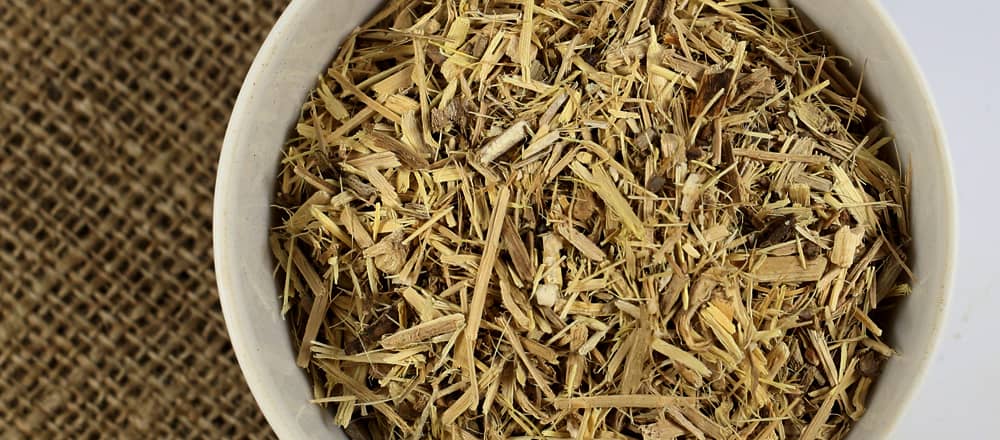
Side Effects of Ginseng Tea
That’s the advantages of frequent consumption covered well. Unfortunately, we must next examine the disadvantages of Ginseng Tea.
Anyone undergoing hormone treatment should avoid it due to reports of increased heart rates or blood pressure, headaches, loss of appetite and insomnia. These Ginseng Tea side effects could also apply to people not undergoing treatment in rare instances.
Meanwhile, those taking diabetes medication should monitor their intake of the infusion as it might affect blood sugar levels. The consensus is that moderation is key, especially since the latest evidence points to Ginseng Tea’s benefits decreasing with extended use.
Therefore, to maximise its potential, we recommend enjoying it for 2-3 week cycles prior to a one- or two-week break in between.
Ginseng Tea and Pregnancy
The idea of drinking Ginseng Tea while pregnant might sound appealing on the surface, yet there is evidence that it could cause complications. A 2003 animal-based study found that ginsenosides led to abnormalities in rat embryos.
In 2005, a study involving mice noted the same issues. While few human studies have been conducted, it is almost always best to err on the side of caution.
What about Ginseng Tea during breastfeeding? The reality is that there has been little research making a case either for or against its use. Once again, however, we’d urge you to steer clear of it to be on the safe side.
Consider instead Herbal Tea types that serve as galactagogues (something that boosts breast milk supply), such as Fennel Tea. Be sure to speak to a doctor or midwife if you have any concerns.
Conclusion
Ginseng tea is a beverage with many potential health benefits. The scientific evidence behind these claims is strong, and there are many ways to enjoy the health benefits of ginseng tea. If you are looking for an energizing and healthy drink, consider giving ginseng tea a try. Thanks for reading!

 Loose Leaf Tea
Loose Leaf Tea Pyramids
Pyramids Tea Bags
Tea Bags Africa
Africa Assam
Assam Ceylon
Ceylon Chinese
Chinese Darjeeling
Darjeeling European
European Indian
Indian Japan
Japan Nepal
Nepal South East Asia
South East Asia Ayurveda Tea
Ayurveda Tea Black Tea
Black Tea Chai Tea
Chai Tea Flowering Tea
Flowering Tea Fruit Tisanes
Fruit Tisanes Green Tea
Green Tea Herbal Tea
Herbal Tea Matcha Tea
Matcha Tea Oolong Tea
Oolong Tea Organic Tea
Organic Tea Pu erh Tea
Pu erh Tea Rooibos Tea
Rooibos Tea White Tea
White Tea Asian Coffee
Asian Coffee Caribbean Coffee
Caribbean Coffee Central American Coffee
Central American Coffee South American Coffee
South American Coffee Coffee Blends
Coffee Blends Decaffeinated Coffee
Decaffeinated Coffee Espresso Coffee
Espresso Coffee Ethically Sourced Coffee
Ethically Sourced Coffee Flavoured Coffee
Flavoured Coffee Organic Coffee
Organic Coffee Single Origin Coffee
Single Origin Coffee Chocolate 1
Chocolate 1 Chocolate 2
Chocolate 2 Chocolate 3
Chocolate 3 Chocolate 4
Chocolate 4 Chocolate 5
Chocolate 5 Chocolate 6
Chocolate 6 Chocolate 7
Chocolate 7 Chocolate 8
Chocolate 8 Chocolate 9
Chocolate 9 Loose Tea Filters
Loose Tea Filters Tea Accessories
Tea Accessories Tea Bricks
Tea Bricks Tea Caddies
Tea Caddies Tea Caddy Spoons
Tea Caddy Spoons Tea Gift Ideas
Tea Gift Ideas Tea Infusers
Tea Infusers Tea Strainers
Tea Strainers